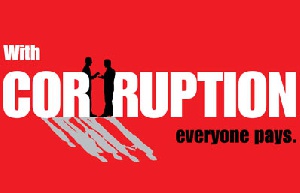Dr. Roger Koranteng, Associate Professor and Principal specialist responsible for the Public Sector Governance and Anti-Corruption, Commonwealth Secretariat, said a major setback in the fight against corruption in Africa is political interference.
He noted that; “the mode of appointment to high public offices, African family and traditional systems, and social-political networks all tends to hinder anti-corruption and accountability institutions quest to fight against corruption”.
Dr Koranteng, who is also responsible for governance, anti-corruption, democratic and oversight institutions in all the 52 Commonwealth countries, also identified weak institutions in terms of enforcement of laws, capacity of officials of anti-corruption institutions, as another obstacle obstructing the fight against corruption.
Dr Koranteng made this known in an interview with the Ghana News Agency in Accra, during the Executive Leadership and Management Programme for Heads and Senior Managers of key Anti-Corruption and Accountability Institutions in Ghana.
The seminar was organised by the Commission on Human Rights and Administrative Justice (CHRAJ), in collaboration with the Commonwealth Secretariat.
The programme aimed at strengthening the capacity of the anti-corruption and accountability institutions to promote efficiency, transparency and accountability in Ghana, in furtherance of the Sustainable Development Goals (SDGs).
Dr Koranteng noted that corruption is a human nature, which can be eradicated with the right political will, building the capacity of anti-corruption institutions, and providing the necessary financial empowerment to the institutions.
He said the legal regime must also support the anti-corruption institutions to ensure that all agents of State work together.
On the appointment of the first ever Special Prosecutor, Dr Koranteng commended the effort of the government, but noted that the success or otherwise of the office would depend on the person in the high office, the person’s understanding of independence, and his posture with political authorities.
He urged the Special Prosecutor to apply the laws without fear or favour as his performance will determine largely the way forward in the fight against corruption.
Mr Richard Quayson, CHRAJ Deputy Commissioner, described corruption is an insidious plague that has a wide range of corrosive effects on societies. “It undermines democracy and the rule of law, leads to violations of human rights, distorts markets, erodes the quality of life and allows organised crime, terrorism and other threats to human security to flourish.
“It hampers efforts to alleviate poverty, undermines political stability and economic growth and diminishes the country’s attractiveness for investment”.
He said the Ghanaian society, recognising the negative impacts of corruption, has over the years, undertaken various policies and measures to control it, through established legal and institutional mechanisms, pursued sound economic and public sector reforms and strengthened financial management systems.
He said in 1998, the country organised the first National Integrity Conference that made significant proposals to tackle corruption and build integrity, significant developments have taken place since that conference.
Mr Quayson noted that the country has since continued to strengthen the legal and intuitional framework for fighting corruption and lifted her economic and public sector reforms to a higher pedestal and begun rationalising the remuneration structure of the public service.
The CHRAJ Deputy Commissioner recalled that the Second National Conference on Integrity was organised in October 2011, which enabled anti-corruption practitioners, government, parliamentarians, civil society, the private sector and development partners to take stock of efforts to combat corruption and build a robust ethics infrastructure for the country.
He said the conference discussed, evaluated and validated the Draft National Anti-Corruption Action Plan (NACAP).
Mr Quayson noted that the country has made significant progress with the introduction and implementation of the various anti-corruption measures but there are still challenges.
“The adoption of a strategy that transcends political boundaries and tackles corruption holistically through prevention, education and enforcement is necessary.
“NACAP is an unqualified contribution to the fight against corruption and the promotion of national development,” he said.
He said the control of corruption in Ghana should be the responsibility of each citizen, empowered through NACAP, an opportunity to join hands and tackle corruption in the country in order to secure and sustain the nation’s development.
General News of Wednesday, 21 February 2018
Source: ghananewsagency.org

















